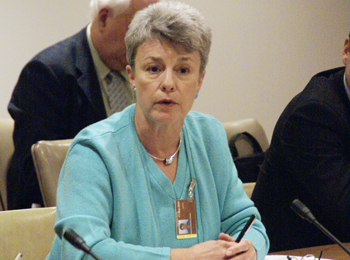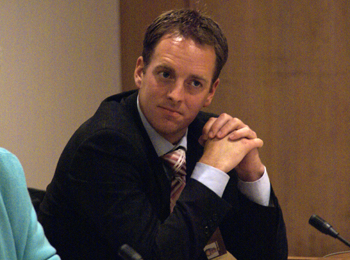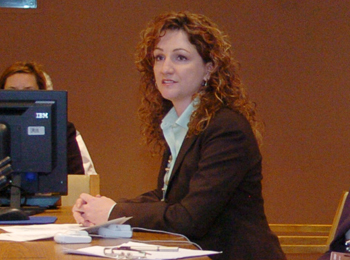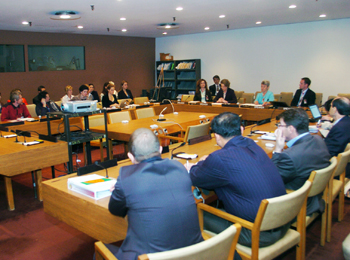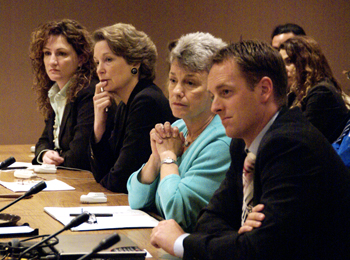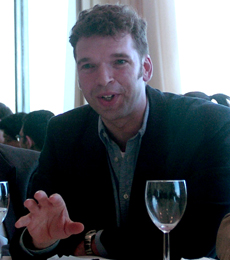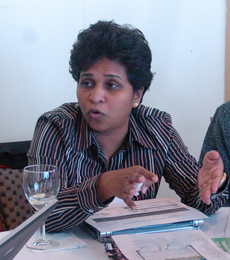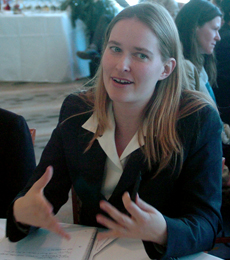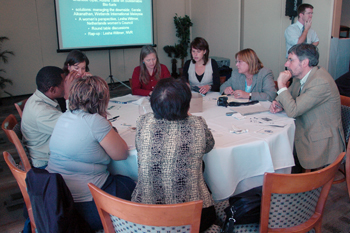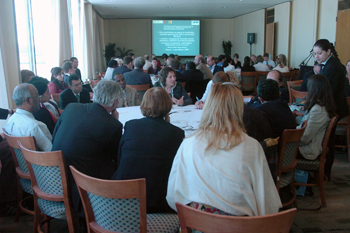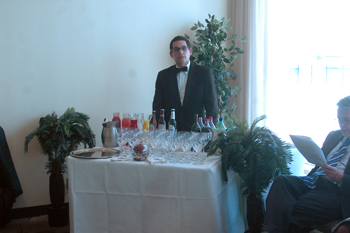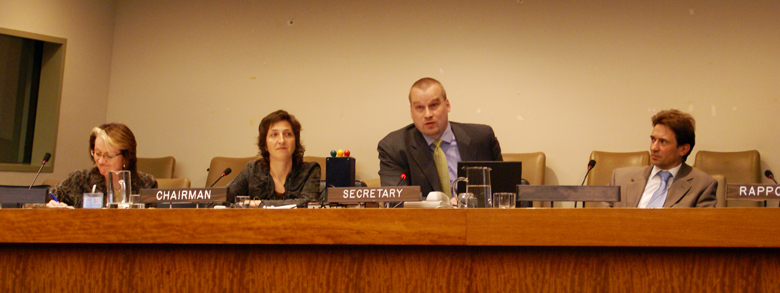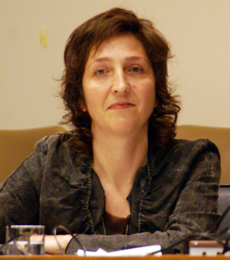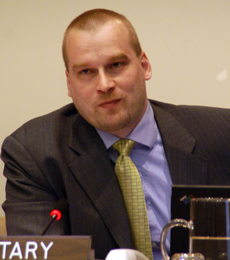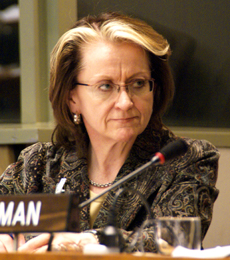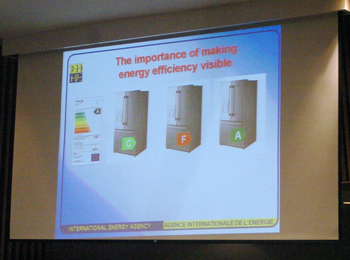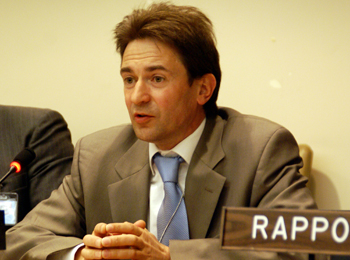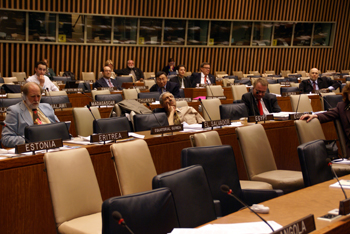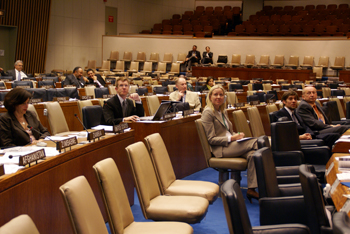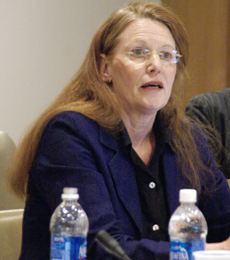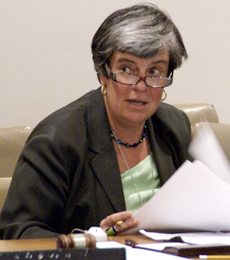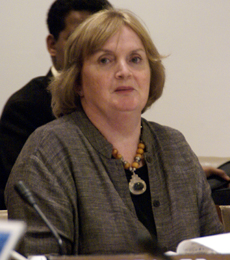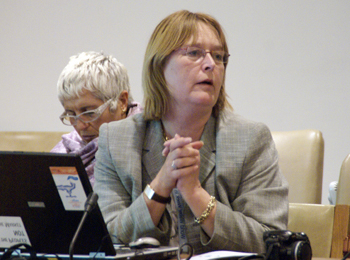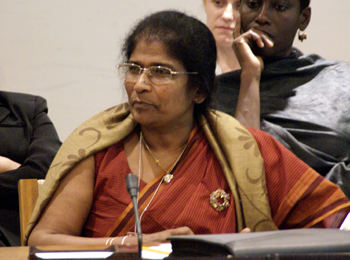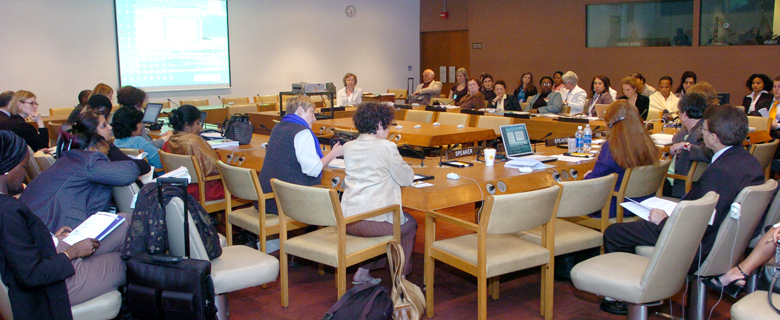 |
||
|
published by IISD, the International Institute for Sustainable Development
in cooperation with the UNDP Secretariat |
|||
|
Special Report on Selected Side Events at the Fifteenth Session of the Commission on Sustainable Development (CSD-15)
|
|||||
| 30 April - 11 May 2007 | United Nations headquarters, New York | |||||
 |
 |
|||
 |
||||
Events convened on Tuesday, 1 May 2007
|
Angelina Howard, Nuclear Energy Institute, introduced the side event, emphasizing that sustainable development depends on providing enough energy production to meet countries’ basic needs and also allow for economic growth. Howard noted that roughly 11% of world electricity generation is provided by nuclear energy. Recalling Dwight Eisenhower’s, “Atoms for Peace” speech in 1953, Susan Eisenshower, The Eisenhower Group, said that nuclear power has since had beneficial impacts on medicine, agriculture, and energy production. She emphasized that in light of climate change, nuclear energy is once again under review as the world’s largest source of energy that can effectively address the rising global demand for electricity while not contributing to carbon emissions. Eisenhower stated that although nuclear power has its critics, it is an efficient, safe, and relatively abundant energy source. She added that new technologies exist that mitigate the problem of nuclear waste. Per Jander, World Nuclear Association, described the World Nuclear University (WNU), a public-private partnership comprised of nuclear science and technology learning institutions. He explained that WNU’s programmes, inter alia, build nuclear leadership, enhance public understanding of nuclear energy, and strengthen international nuclear workforce professionalism. Jander also described WNU’s Summer Institute, which aims at building future global leadership in the fields of nuclear science and technology. Lisa Stiles, North American Young Generation in Nuclear (NAYGN), said that the world’s youth are excited about new nuclear technologies, demonstrated by surging enrollment in nuclear engineering programs. She then described the International Youth Nuclear Congress, and NAYGN, an organization in North America that brings together young professionals interested in nuclear science and technology. In the ensuing and often emotional discussion, many participants questioned the safety and environmental sustainability of nuclear energy, with some saying that nuclear energy should not be considered as a sustainable option. One participant emphasized that the “Atoms for Peace” speech should have been called “Atoms for War.” The panelists responded by emphasizing that nuclear energy was not the sole answer to the energy crisis, but one of the options in an energy portfolio. One participant questioned whether it is ethical to promote nuclear energy use in developing countries. Another participant from South Africa responded that each country can make its own decisions. |
||||
|
|||
|
Ton Boon von Ochssée, Ambassador for Sustainable Development, the Netherlands, introduced the event, which he described as a discussion on managing the “upside and downside” of biofuels.
Nienke Smeets, Ministry of Housing, Spatial Planning and the Environment, the Netherlands, reported on the Cramer Commission, her country’s effort to develop sustainability criteria for biofuels. The criteria assess biofuel sustainability in six areas: greenhouse gas emissions; land use, including competition with food production; biodiversity; welfare; social wellbeing; and other environmental concerns including waste, agrochemicals, water and soil quality. Andre Faaij, University of Utrecht, discussed the potential impacts of using land for energy production. He advocated using perennial crops such as trees and grasses that maintain a root system and therefore store carbon, use less energy than food crops, and can repair degraded land. He also recognized that better technology is required to convert such crops into biofuels. Martina Otto, UNEP, reported that worldwide investment in biofuels totalled US $2.66 billion in 2005, and is being driven by the need to address energy security, climate change and rural development. She said that achieving sustainability requires managing issues of climate change, biodiversity protection, food security and food prices, water, soil degradation and recovery, air pollution and labor. Otto said UNEP is working with governments to develop biofuel sustainability criteria using a life-cycle approach that examines production, conversion, transportation and end use. Charlotte Opal, Swiss Federal Technical Institute in Lausanne, announced the formation of a multi-stakeholder roundtable to develop draft global standards for sustainable biofuels production and processing, and invited participation by all stakeholders who wish to take part. Sarala Aikanathan, Wetlands International, explained that peat forests in southeast Asia emit large amounts of carbon dioxide when degraded, burnt or cleared for growing oil palms for biofuel. She advocated use of embankments to preserve peatland hydrology, fire prevention programs for local communities and plantations, and use of degraded land for growing oil palms, rather than clearing more forest. Discussions took place in multiple small groups, after which Lesha Witmer, Netherlands Council of Women, summarized major points including: creating cooperatives to allow small-scale biofuel farmers to survive; the role of women in biofuel production and land management; the need for education and consultation with women; and ensuring adequate wages for agricultural workers through certification. |
|||
|
|||
|
Carolyn Hannan, UN Division for the Advancement of Women, introduced the session, saying that the study built on the findings of the United Nations Conference on Women, held in 1992 in Beijing, China, and the 1997 and 2002 sessions of the Commission on the Status of Women, and recognized that economic, social and environmental factors are interrelated and important aspects of sustainable development. Gerd Johnsson-Latham, Ministry for Foreign Affairs, Sweden, outlined the report on “gender equality as a prerequisite for sustainable development,” noting that the study examined how the actions of women and men affect access to resources and power, which in turn affects lifestyles and consumption patterns, and therefore ecological and human environments and sustainability. She described how the study further shows that “rich” men account for the greater part of energy use and carbon dioxide emissions, as they commonly set infrastructure and political trends. Marie Thynell, Göteborg University, provided insights into gender-specific patterns of transportation by highlighting those of car and road use. She said that a car-owning society does not favor women, noting that approximately 10% of the world's population owns cars, and around 70% of those owners are men. She said that the patterns and reasons for women’s travel differ from those of men, explaining that women take more trips during off-peak hours and off the principal routes, and make shorter and more frequent trips.She hoped that women would play a more prominent role in transportation policy. Johnsson-Latham then summarized the report, highlighting the need for gender equality as a precondition for achieving sustainable welfare, and calling for the social dimension of sustainability to be strengthened. Participants discussed, inter alia, the mobility patterns of women in relation to urban planning cycles, and policy reactions to the links between gender and class. |
|||||
|
|||
|
Kaarin Taipale, Marrakech Task Force on Sustainable Buildings and Construction, facilitated the side event, noting that energy efficiency is relevant to all CSD topics.
Paul Waide, International Energy Agency (IEA), outlined the economic and emissions savings that can result from improving energy efficiency. He urged governments and consumers to focus on the total life-cycle costs of efficient products, rather than the initial costs, highlighting that using efficient products can result in electricity savings of around 40% for street lighting, 33% for home lighting, 35% for appliances and 29% for residential and commercial buildings. He lamented that market failure often prevents potential savings from occurring, and called for policies, including incentives and market-based instruments, to “get the energy price right.” Timo Husu, Motiva, Finland, reported on the “Energy Audit 06” conference held in Lahti, Finland. He said that two of the conference's objectives were to increase international cooperation in energy auditing, and to consider establishing an international energy audit programme to share best practices and take practical steps through bilateral and multilateral projects. He added that energy audits provide information on existing energy use and distribution, identify potential energy-saving measures, and allow end users to take informed actions. Martina Otto, UNEP, reported on a workshop entitled “Scaling-up energy efficiency,” held in April 2007 in Paris, France, which aimed to accelerate the global diffusion of energy-efficiency measures. She stressed that urban planning decisions can affect transportation choices, and advocated energy-efficient modes of transport such as “bus rapid transit systems,” which have been successfully implemented through pilot projects in Curitiba, Brazil, and Beijing, China. |
|||
|
|||
|
||
|
Click the above button to go back to our ENB main coverage
|
||
|
|
|
|
|
||
|
